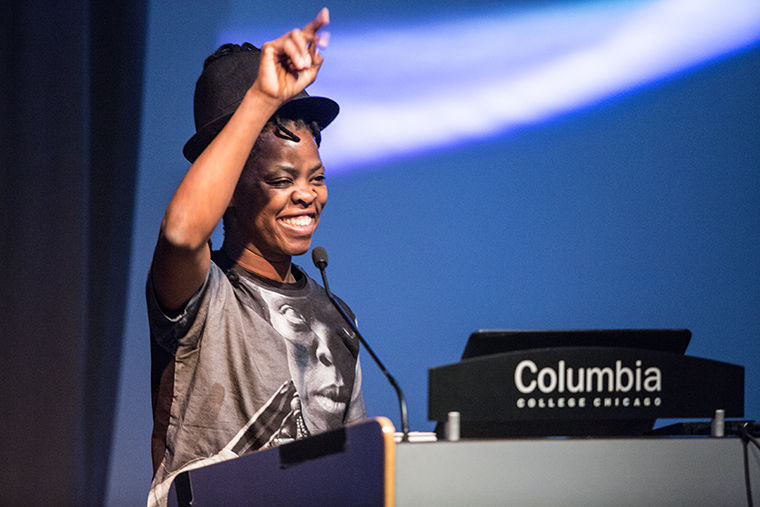Photographer details LGBTI activism with Columbia
Zanele Muholi, photographer and visual activist, shared her projects involving South Africa’s LGBTI community Feb.24 at the college’s Stage Two auditorium.
February 29, 2016
When Zanele Muholi stands before her photo subjects, mostly members of the LGBTI community ordinarily discriminated against in her home country of South Africa—she says one thought is always on her mind, “I hope nothing happens to the person I’m photographing.”
Muholi, a photographer and visual artist who advocates for the rights of her country’s LGBTI community, presented a lecture on Feb. 24 at the Stage Two auditorium in the 618 S. Michigan Ave. Building.
“Most of the people I’ve photographed [for] more than 10 years are friends, acquaintances and activists who are doing amazing work in our spaces but who never get an opportunity to be written in history,” Muholi said.
Muholi said members of the LGBTI community in her country live in constant fear of being persecuted or abused because of their gender identity or sexual orientation. She said she felt a responsibility to record a visual history with her photographs and videos in South Africa and beyond, she added.
“For us not to complain or to blame anyone for further distorting our lives—I had to be responsible,” Muholi said. “I had to claim my one position and also my existence in that particular space.”
Natasha Egan, executive director of the Museum of Contemporary Photography an adjunct professor in the Photography Department, said in a Feb. 22 emailed statement the museum invited Muholi to the college as part of the “Lectures in Photography” partnership between the MoCP and the college’s Photography Department.
Muholi presented the documentary “We Live in Fear,” a collaborative piece with the Human Rights Watch, a nonprofit organization focused on protecting human rights, shot in three different South African locations.
The documentary included scenes of Muholi braiding one of her friend’s hair before a photoshoot, several funerals of lesbians who were brutally murdered and a 2013 Limpopo Pride contest Muholi and her crew attended.
In “We Live in Fear,” Muholi recalled how 2012 was one of the most painful years in South African history because the country lost multiple members of the LGBTI community to retaliatory rapes and lesbian murders.
“We live in fear,” Muholi said in the documentary. “Hate crimes have become a binding factor for the LGBTI community.”
Muholi said it is her job to document the atrocities and funerals to create further awareness.
In 2006, Muholi founded Inkanyiso, a queer advocacy organization focused on delivering information regarding the LGBTI community that is not being covered by mainstream media.
Muholi presented three of her photography projects at the lecture, including Sonyama-Ngonyama, an ongoing project she has been working on since 2014 for which she has taken 110 daily self-portraits with props from around the world, such as chopsticks and mirrors to tell stories.
During the Q&A, Muholi said the self-portraits are motivated not only by her curiosity about the history and politics and the people she shoots, but also by the desire to communicate internal issues.
Claire Woolcott, a junior photography major, said she found Muholi’s self-portrait collection the most interesting project because it is connected to a specific political event or feeling Muholi experienced.
“There’s something really profound and powerful when documenting a community from within a community,” Woolcott said.








